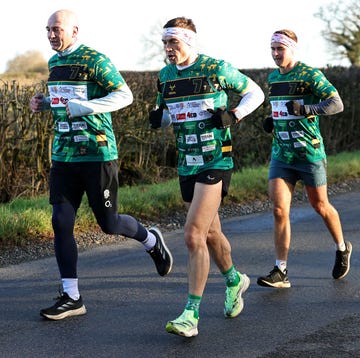Perhaps you’ve set a goal to improve your time over the half marathon or marathon, but can’t seem to get faster – or a running pace that should be manageable is currently out of reach. While you might have taken time to review your training plan, or considered external factors such as family commitments or busy periods at work, there’s another surprising thing that could be hindering your running progress: how you view your body.
Every person who chooses to run – no matter what their age, shape or size, and no matter how fast or frequently they move – is part of the running community and deserves to enjoy and feel comfortable in themselves while running. This becomes particularly important when you consider the findings of a new study, published in the journal Body Image, European Cross Country Championships results.
More specifically, the research explored the way in which positive and negative body image perspectives, and the recollection of embarrassing or proud memories, would affect task – and athletic – performance.
The study involved 100 men and women, all of whom completed a survey that assessed body-related emotions of shame and guilt – where they agreed or disagreed with statements like, ‘I feel guilty that I don’t do enough to improve the way I look’, for example – as well as overall appreciation of their appearance.
Then, the participants undertook a writing task that tapped into their body-related, self-conscious emotions, and which asked them to describe a time when they felt either proud or embarrassed about their bodies. Directly afterward, the participants were asked to perform certain tasks on a computer that required speed and precision while using a cursor or joystick. They were also asked to complete this test before the survey and writing task so that researchers could compare movement speed and learning capability.
According to lead researcher Judith Bek, a research scientist at University College Dublin’s School of Psychology, the participants who recalled embarrassing stories performed worse than the pride group – and this effect was stronger in men.
‘We found that men, overall, showed a stronger effect of reliving an embarrassing body-related experience than women,’ Bek told Runner’s World. ‘For men, the greatest impact was on how long it took to complete the movement task, whereas for women the accuracy of the movement was more affected.’
In other words, for men, the more embarrassed they felt, the longer it took them to complete the task. For women, embarrassment led to less accuracy.
Bek suggests that women may have been less affected because, generally speaking, they have a greater tendency to focus on and feel embarrassed about their bodies. ‘Because of that, women may have already been self-objectifying to an extent before coming into the study,’ she said.
Although this study observed small movements using a cursor or joystick, Bek stated that the results could still apply to any type of movement, including running or other forms of exercise. For example, recalling embarrassing memories during a run might inadvertently cause you to slow down and, as a result, reduce your running performance running form and, as a result, reduce your running performance.
‘Focusing on the body, and experiencing self-conscious emotions like embarrassment, can take mental resources such as attention away from the task being performed,’ she said. ‘That can lead to a deterioration in movement time or accuracy.’
So, what are the best strategies for counteracting a sense of self-consciousness on the run? As Bek notes, it’s difficult to recommend a specific tactic, like trying to think positive thoughts about your body, when you’re awash in feeling the opposite at that moment in time. However, one way to move forward, she says, is to ask for constructive feedback on your running performance – whether that’s from a coach, a friend or a running group – The growth of running crews.
This could be as simple as getting high fives from friends after finishing a run that you didn’t initially want to do, or being congratulated for completing a tough interval session or long run. Bek added that this type of reward doesn’t have to be body-specific, either – just something that enhances an overall sense of wellbeing.
If you usually run solo, congratulate yourself. As Bek notes, this might change the messaging loop in your brain from embarrassment or criticism to acceptance – and your running performance could improve as a result.













